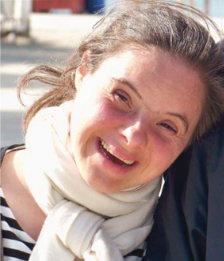Words on the Word
Mary, Mother of God
You can find the French original text here.
Numbers 6:22-27: May the Lord let his face shine on you.
Galatians 4:4-7: To enable us to be adopted as sons.
Luke 2:15-21: They gave him the name Jesus.
 For Christmas, I received a documentary about a young woman who died in 2013, in the odour of sanctity. The life of Claire Émerentienne Fichefeux, whose process of beatification is imminent, began in an abyss of suffering. Born with Down’s, she was abandoned by her biological parents. She lived through the first stage of her existence without attachments, locked in herself. Her adoptive parents found her skinny and strangely shrunk. It seems she had never ever cried. Nine months old, she was ‘dried out, wrinkled like an old woman’. She refused to eat.
For Christmas, I received a documentary about a young woman who died in 2013, in the odour of sanctity. The life of Claire Émerentienne Fichefeux, whose process of beatification is imminent, began in an abyss of suffering. Born with Down’s, she was abandoned by her biological parents. She lived through the first stage of her existence without attachments, locked in herself. Her adoptive parents found her skinny and strangely shrunk. It seems she had never ever cried. Nine months old, she was ‘dried out, wrinkled like an old woman’. She refused to eat.
In the film, a family friend tells a story that has haunted me this Christmas. This lady turned up at the Fichefeux’s house one day at the time of Claire’s morning bottle. She saw how the infant looked around ‘with incredible sadness, as if she was drowning in a wave of sadness that arose from the depth of her being’. Remember, she was nine months old! She would not take the bottle. Her adoptive parents, however, persisted gently: ‘Eat, Claire, we want you to eat!’ In the end she yielded. It was, says the witness, ‘like a Yes to life’ despite all; as if Claire said: ‘Yes, you will love me, and your love will be stronger than the pain that keeps me bound.’
Why am I telling you this? First, because this scene represents in modern — and astonishingly pertinent — terms a biblical parable about the utter gratuity of salvation. I think of that passage in Ezekiel 16 in which the Lord says to Israel: ‘On the day you were born, you were not rubbed with salt. No eye pitied you. You were cast out on the open field. I passed by and saw you, and I said to you in your blood: ‘Live!’’ All of us have, before God, been that child; we have all received this divine call to live, to opt for life in fullness. On new year’s day it is good to be mindful of this, and to give thanks.
Secondly, the story of Claire Émerentienne puts before us a crucial aspect of a child’s relationship to his or her parents — and what we celebrate today is a maternity. Contemplating the Mother of God, we run the risk of adopting a point of view that is either very abstract or very sentimental. Of course, we should be conscious of the metaphysical aspect: that the eternal Logos, ‘Light from light’ should be born of a woman of flesh and dust, like us, makes us dizzy. We should likewise meditate on Mary’s gentleness, so touchingly manifest in the cribs that seem to be everywhere here in your monastery. Yet the essential dimension of Mary’s maternity is this: that the Almighty chose to be powerless in her embrace. He, too, was bound, surrendered to the care of his Mother, waiting for her to tell him, ‘Live!’, and to give him the means to do so.
To be a mother or father is not limited to the generative act; she is a mother, and he is a father, who allows generated life to be realised in its irreducible otherness. For Claire, filiation came about by means of adoption. So it is striking to hear St Paul link the physical maternity of Mary with the redemption by which you and I were ‘adopted as sons’. On our dried-out hearts, on our premature ancientness, the Lord breathes his Spirit and says, ‘Live!’, inviting us to call him Abba, ‘Father’. This miracle is wrought in the Church, our Mother, of whom Mary is the embodied image.

In former times, when a foundation was made in our Order, the founders left home carrying a founders’ cross with the inscription, ‘Vive Jésus! —May Jesus live!’ This is no mere formalism. For Jesus to live in us, among us, we must, like Mary before the angel, give our free consent, to be continually confirmed by our options and actions. Mary’s maternity concerns us. By the Marian consecration of our Order we wish to construct our lives according to a maternal logic, exegeted for us by our Fathers, who were enchanted by what Christmas symbolises. May Jesus live! Each day, God comes looking for our Yes to his life in us: ‘Live, Jesus!’
This maternal character will also mark our fraternal life. A crucial term by which St Benedict speaks of relationships between monks is ‘honor’. It designates a basic element in the building-up of the Cistercian school of charity. For charity cannot be reduced to affectivity. No one can command our affection. To honour one’s brethren! It is a great and demanding enterprise. It is a matter of recognising and affirming the uniqueness of the other; of bowing down before the mystery he incarnates by his vocation and freedom; of being open to the presence of Christ in him; of looking upon him with hope, saying: ‘Live! I want you to be!’ Thus the vertical, christocentric axis of our life is authenticated by our horizontal, fraternal relations.
May the powerful intercession of the Mother of God help us, this year, to live in this way, so to console, by our choices, the sorrow of this world and to bear coherent witness to the great, joyful fruitfulness of life in Christ. Amen.
